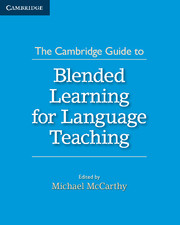Section 5 - The Future of Blended Learning
Published online by Cambridge University Press: 22 September 2021
Summary
The title of Chapter 13 includes the words: ‘new tools, new learning experiences’, which represents the core of Dudeney and Hockly's vision for the potential of mobile technologies in language learning. This vision is that the smartphones, tablets and other mobile devices which play such a routine part in the daily lives of many people can not only provide new channels and media for the kinds of language learning we are familiar with but also new types of learning experience not previously envisioned. The challenge, as in many of the other chapters in the present volume, is the successful integration of such new tools and what they can offer into the world of teachers and learners in an unthreatening and motivating way, so as to provide learning outcomes that lead to success. Most notably, Dudeney and Hockly see such outcomes extending beyond the classroom into lifelong learning in the world outside, and, in reverse, the technology offering new ways of bringing the outside world to the classroom. By engaging the users’ natural, daily use of mobile devices (e.g., to take photographs, make videos, record audio, send text messages, etc.) in the service of language-learning tasks, the mobile devices become more than bolt-on extras to the existing technologies, and offer new and unforeseen possibilities for blended learning (BL) and for ‘flipping’ classroom practices. As with other chapters in this volume, exploiting the technology should be grounded in robust learning theories, and learners will need guidance and help in the transition from more behaviourist uses of their devices towards more creative, constructionist contexts, and uses which integrate seamlessly into best-practice language teaching. Mobile learning is a ‘new literacy’, offering the potential for new life skills as well as enhanced and motivating language learning.
In Chapter 14, San Pedro and Baker examine the benefits of adaptive learning, that is to say, the ability of the machine to give tailored, personalised feedback to the user in computer-mediated learning. Although personalisation is possible without technology, technology can enhance the potential for individual feedback, as well as offering institutions economically viable ways of providing learning programmes for large populations of learners in ways that would be impossible in conventional classrooms.
Information
- Type
- Chapter
- Information
- The Cambridge Guide to Blended Learning for Language Teaching , pp. 217 - 218Publisher: Cambridge University PressPrint publication year: 2015
